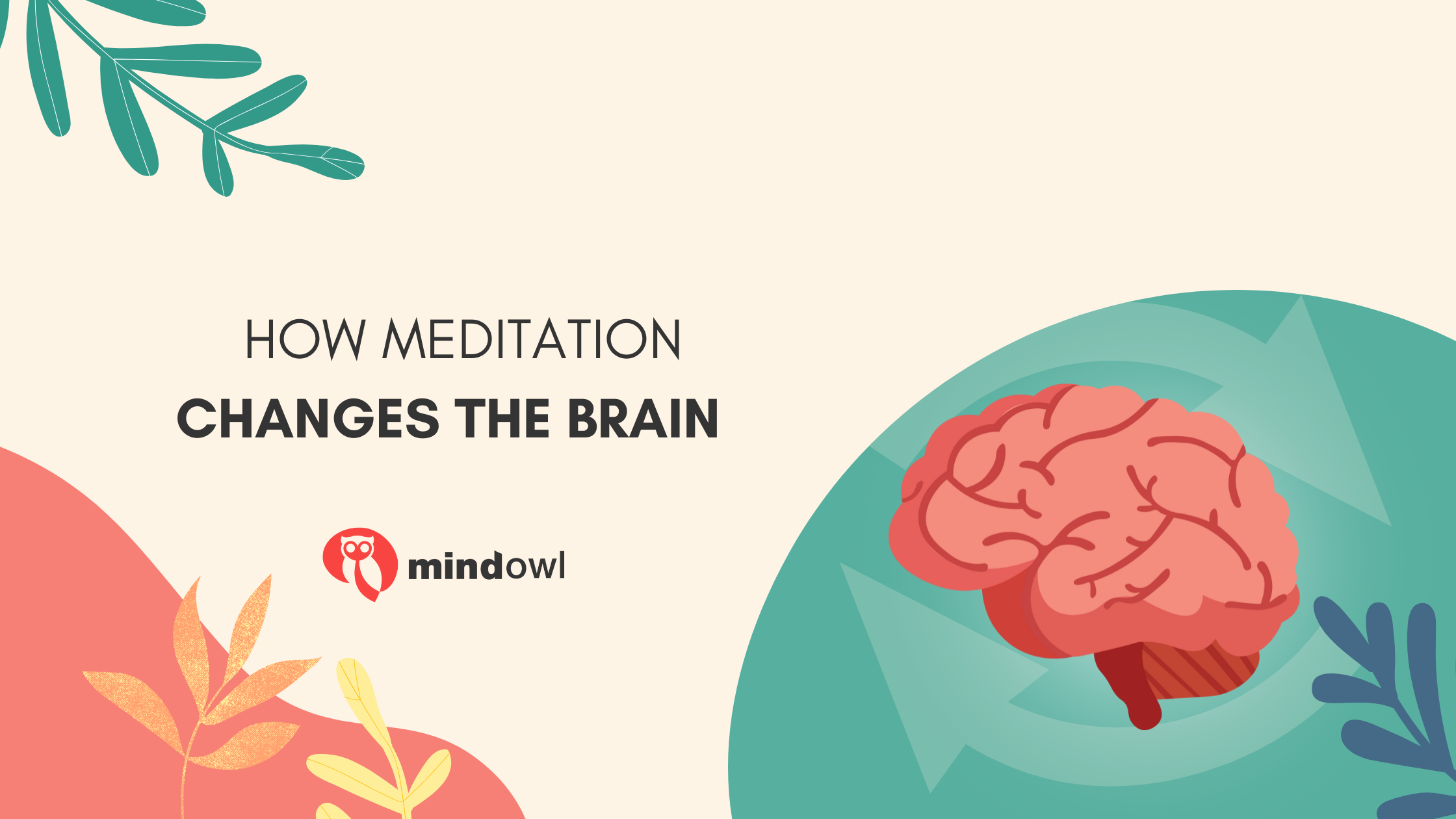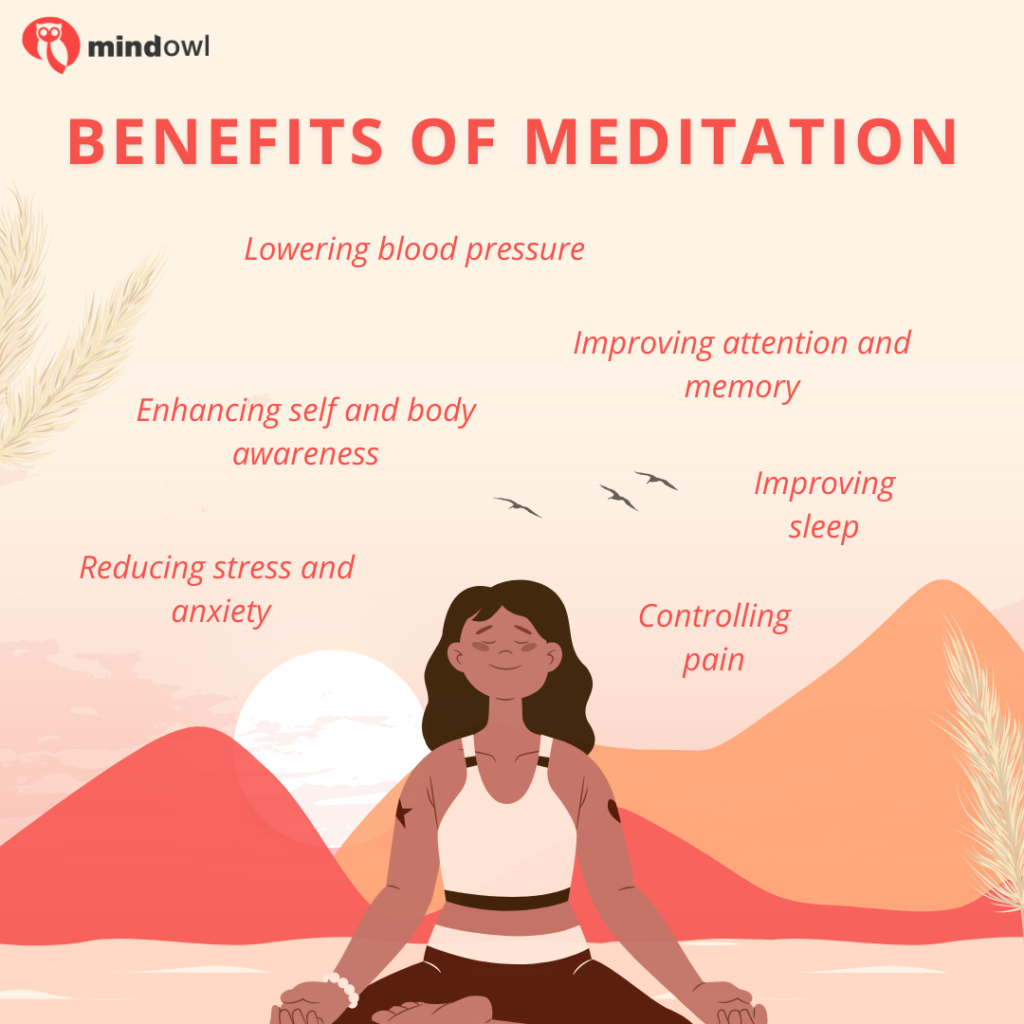Meditation has been shown by researchers to help reduce stress, boost calmness, and improve mental health — but how does this happen? Research shows that meditation achieves positive results by physically changing parts of the brain. Meditating for a few minutes a day might help rein in wandering thoughts and help you stay focused throughout the day, but its effects can extend way beyond that. Some studies show that it affects the entire brain in various ways, from changing the brain’s volume to decreasing activity in the parts of the brain responsible for stress.
In this article, we’re going to explain what meditation is and show how meditative practices can affect the different regions of the brain and improve brain function as a whole.
What is Meditation?
Meditation practice has existed for thousands of years. Whether it’s the ancient Buddhist practices that originated in Asia back in the day, or the adapted modern mindfulness techniques you see today, mindfulness meditation asks participants to focus their attention on a particular object, activity, or thought to train attention and awareness and achieve a mentally clear, emotionally calm, and stable state.
It’s an effective tool for training your mind to focus and direct your thoughts, and it can also reduce feelings of stress, anxiety, and depression.
The goal of meditation is different for everyone. Some meditate to reduce stress or improve their quality of life, while others try to improve their concentration and memory through mindfulness training.
There are various different types of meditation. They include:
- Mindfulness meditation
- Guided visualization
- Zen meditation
- Focused attention meditation
- Transcendental Meditation
- Loving-kindness meditation
There is no one right way to meditate. It’s up to you. The practice is unique and can be tailored to suit your needs and personality, with different practices containing different pros and cons. The type of meditation that fits best with what you need can only be decided by you. Check out our article on the six main types of meditation for some more guidance on how to choose a meditation practice that suits you.
How Does Meditation Work?
Meditation has various purposes. It can help you become more aware of your surroundings or give you that much-needed break during the middle of an extremely busy day.
The benefits of meditation include:
- lowering blood pressure
- reducing stress and anxiety
- controlling pain
- improving attention and strengthening memory
- enhancing self and body awareness
- improving sleep
The practice of meditation typically involves the following elements:
- A quiet location
- Comfortable posture
- Ability to let go of distractions
- A focus on breathing and attention
Meditation can be practised alone, in a group, guided by a teacher, or even through a recording or video. If you’re a beginner, start with just a couple of minutes then gradually increase your time as you start to feel more comfortable.
Sit quietly for a few minutes, breathing deeply through your nose and exhaling slowly through your mouth. Each time you breathe, focus on your breath. Don’t be discouraged if you lose focus and your thoughts start to wander. Simply return your thoughts back to your breathing.
The effects of meditation on the brain
Though meditation has been around for centuries, recent scientific research has allowed scientists to discover its effects on the brain network. Research shows that meditation can change your brain’s structure, which may be why it helps people feel happier and more relaxed. Others show that it can change entire brain functions.
Meditation has measurable effects on four areas of your brain:
- Gray matter — involved with muscle control and sensory perception including emotions, memory, language, vision, hearing, and decision-making
- Prefrontal cortex — responsible for decision making
- Amygdala — controls emotional regulation and response
- Hippocampus — responsible for memory and learning
Brain structure changes
Mindful meditation changes the way your brain responds to distractions. When you can focus solely on the present moment and train yourself to do this consistently, the structure of the brain changes.
A team of researchers found that Jon Kabat-Zinn’s eight-week course, Mindfulness-Based Stress Reduction Program (MBSR) increased the cortical thickness (gray matter concentration) of the hippocampus – this is the part of the brain responsible for memory and emotion regulation.
The study also found a decrease in the volume of the amygdala – the part of the brain responsible for emotions such as stress, fear, and anxiety. Those who showed brain changes also reported feeling less stressed, highlighting the impact these alterations to the brain can have on moods and emotions.
Reduces stress
It can be hard to concentrate when you feel stressed or agitated. A 2016 study into the brain activity of 35 unemployed adults seeking work found that participants reported feeling a tremendous amount of stress and fatigue.
Participants were trained in mindfulness meditation, and researchers reviewed the brain scans of participants after 3 days of training. They found more activity in the areas of the brain related to the resting state. After four months, they were scanned again and nearly all of the people who participated reported they felt significantly less stressed and able to relax easier than they did before.
This study highlights the profound impact mindfulness meditation can have in terms of reducing stress. By activating the resting state and internal processing of the default mode network, meditation can help us become calmer, more balanced individuals.
Improves focus and memory
If your mind wanders, it may be hard to focus on a task, whether it’s a work task, a school assignment, a series of errands, or something else entirely.
A study found that a 2-week mindfulness meditation training course improved attention and concentration and reduced mind wandering. Mindful meditation has also been linked to improved reading comprehension and information recollection.
Another study compared the brain scans of a group of people who meditated to those who did not. The researchers found that those who meditated showed greater stability in their ventral posteromedial cortex – the region of the brain associated with spontaneous thoughts and mind wandering. These studies suggest that those who meditate can rein in their wandering thoughts better than those who don’t, and also feel a significant difference in their memory and focus after starting.
Slows aging
As you get older, your brain system changes. Meditation may help prevent some of the negative effects that aging has on the brain.
A 2015 study found that meditation might preserve the brain’s gray matter volume, which controls how fast you process information. This would stall or even reverse the usual cognitive declines that come with aging.
In this study, researchers compared the brain scans of fifty people who meditated regularly for over a 20-year period with the brain scans of those who hadn’t meditated at all. Both groups experienced a loss of gray matter volume as they aged, but those who had been practising meditation experienced a smaller decline.
Reduces anxiety and depression
Meditation has been shown to help improve symptoms of major depression and anxiety.
A 2019 study suggested that mindfulness-based meditation may be effective for alleviating symptoms of depression, either alone or combined with more traditional treatments such as therapy and medication. These positive effects can be felt for up to six months or longer.
It also suggests that meditation might be helpful for easing symptoms of anxiety, but usually, only when combined with other treatments.
Increase in Compassion and Empathy
Research into the effects of meditation has shown that empathy and compassionate behaviour are higher among people who meditate regularly. Studies showed that participants who meditated regularly could focus their attention and reduce emotional responses to images of other people who were either good, bad, or neutral. Even when they weren’t in a meditative state, they were able to achieve this feat. When they were shown disturbing images, they also experienced more compassion for other people.
Part of this comes down to activity in the amygdala, which deals with processing emotions. When meditating, this part of the brain normally shows decreased activity, however, in this experiment, it showed increased activity when participants were shown images.
Another study found that people who meditated regularly had stronger activation levels in their temporal parietal junctures (a part of the brain tied to empathy) when they heard the sounds of people suffering than those who didn’t meditate.
The importance of empathy and compassion to the practice of meditation is underlined by the amount of compassion-based practices that exist within traditional meditative disciplines. One such technique is Tonglen Meditation, which involves aligning your breathing with reflections on the suffering of others. Another is sympathetic joy meditation, which is all about cultivating joy and elation for the happiness of others.
Meditation and the Brain
As you can see, there are many benefits to meditation when it comes to brain health. Whether it’s improving focus and memory, reducing anxiety and depression, or increasing compassion and empathy, meditation is a practice that can benefit us in many ways. Knowing that we’ll be physically altering our brain for the better should be all the motivation we need to start or continue our meditation practice.
Mindful Meditation can be practiced by anyone, and you don’t have to sit down on a cushion for a formal session — you can do it anywhere, including at work, at home, or at school. Meditation doesn’t require any special equipment; all you need to start is a few minutes of quiet time and a safe space, and you can start getting the best out of your brain. If you want to find out more about how mindfulness meditation can become a natural part of your everyday life, check out our article on how to practise mindfulness throughout the day.
Frequently Asked Questions
Does meditation change your brain?
Meditation can significantly alter your brain and the way it works. It can help to reduce anxiety, strengthen memory and improve attention. This isn’t achieved after one session, though — it requires you to commit to the practice for an extended period of time.
What happens to your brain when you meditate?
Meditation strengthens the areas of your brain that are responsible for memory, learning, attention and self-awareness. Over time, mindfulness meditation can increase cognition and memory, and encourage you to feel more positive emotions.
How long does meditation take to change your brain?
Different studies have come up with different answers to this question, but generally speaking, it’s likely to take at least 8 weeks to see significant changes to your behaviours and/or your brain activity. But everyone is different, so don’t worry if it takes longer, or shorter. It all depends on how receptive you are or how often you do the practices.
MindOwl Founder – My own struggles in life have led me to this path of understanding the human condition. I graduated with a bachelor’s degree in philosophy before completing a master’s degree in psychology at Regent’s University London. I then completed a postgraduate diploma in philosophical counselling before being trained in ACT (Acceptance and commitment therapy).
I’ve spent the last eight years studying the encounter of meditative practices with modern psychology.








